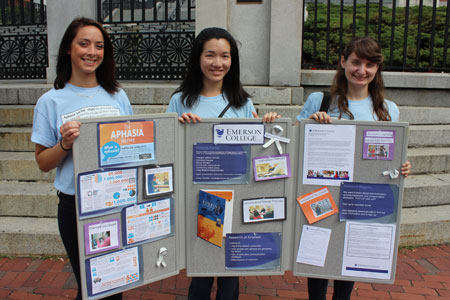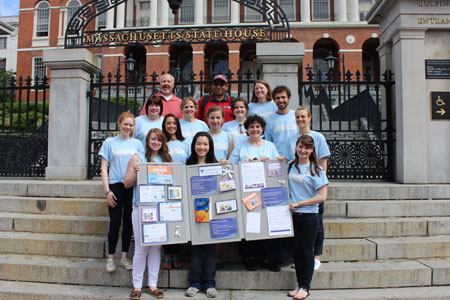Aphasia awareness at State House
A large group from the Department of Communication Sciences and Disorders was at the Massachusetts State House on June 26, testifying and raising awareness about aphasia — a language disorder that affects about one in 250 people.
The date was declared Aphasia Awareness Day in the state, which wrapped up the national Aphasia Awareness Month. Faculty and graduate students from Emerson who provide aphasia treatment spoke with lawmakers about a bill pending in the state Senate that would better track the number of people with aphasia in the Bay State and increase resources for them.
“A big reason we’re involved is to make sure people with aphasia know we [at Emerson] exist as a resource,” said Jena Castro-Casbon, clinical instructor in Communication Sciences and Disorders (CSD), adding that Emerson is one of four locations in Boston that offer aphasia therapy and resources.

Elyse Dion, MA '15, Vanessa Yee, MA '15, and Sarah Cocucco, MA '15, are Communication Sciences and Disorders graduate students who participated in Aphasia Awareness Day at the Massachusetts State House June 26. They are holding an informational display about aphasia that was used during the day. (Photo by Dan O'Brien)
“We see a lot of clients with aphasia,” she said, “but hardly anyone knows what aphasia is until you’re touched by it.”
Aphasia is a neurological disorder that commonly affects people who’ve suffered a stroke, brain injury, brain tumor, or brain infection. Those with the disorder often lose their ability to speak, but the condition does not diminish one’s overall intelligence.
“Aphasia is really a silent disability,” Castro-Casbon said. “We don’t really have walks or charity events, like we do for Alzheimer’s or cancer. Having Aphasia Awareness Day… really helps empower people with aphasia. They feel like they have a voice and understand there are more people like them out there than they realize.”
Castro-Casbon was joined by about 30 CSD graduate students, a handful of people with aphasia who receive treatment at Emerson, fellow clinical instructor Laura Glufling-Tham, and Associate Professor Joanne Lasker.
Glufling-Tham and Lasker both addressed a large Aphasia Awareness Day group before hearings with lawmakers began.
“I have personal experience with aphasia,” Glufling-Tham told the crowd from the podium. “My grandmother had a stroke when I was 22 years old while we were on a trip in California. She suffered from aphasia for the rest of her life. I was very touched and moved by that. I decided to go to graduate school and pursue speech and language pathology because of that experience.”

On the State House steps June 26. Top row: Jeff Carlson and Fred Arthur, who have aphasia and receive treatment at Emerson, with faculty member Jena Castro-Casbon. Second row: Faculty member Laura Glufling-Tham, faculty member Alisa Ruggiero, Stephanie Varley, MA '15, and Stephen Klimashousky, MA '15. Third row: Nell Avault, MA '15, Elyse Dion, MA '15, Kristin Rude, MA '15, Associate Professor Joanne Lasker, and Sarah Smith, MA '15. Front row: Emily Koester, MA '15, Vanessa Yee, MA '15, and Sarah Cocuzzo, MA '15. (Photo by Dan O'Brien) Note: Several other students who attended the event were not pictured.
CSD’s clinical instructors and graduate students regularly provide treatment for people with aphasia, many of whom are in their 50s and 60s. The College accepts clients on a sliding payment scale after their medical insurance providers ceased paying for coverage, Castro-Casbon said.
“There’s a widely held presumption among medical professionals that after three to six months [of having stroke or brain injury], people with aphasia don’t recover much more than they already have,” Castro-Casbon said. “But we know people continue to make gains for the rest of their lives. Research is starting to show that more and more.”
Several graduate students set up an informational table at the State House to educate lawmakers and others about aphasia—marking a sizeable increase of student participation this year over last year.
“It takes [students] getting out of a therapy room to understand how aphasia impacts people on a daily basis, and how aphasia changes people’s lives and the dynamics of a family structure,” Castro-Casbon said. “Aphasia Awareness Day has been a great opportunity for professionals, students, and family members to help people with aphasia advocate for themselves.”
Categories